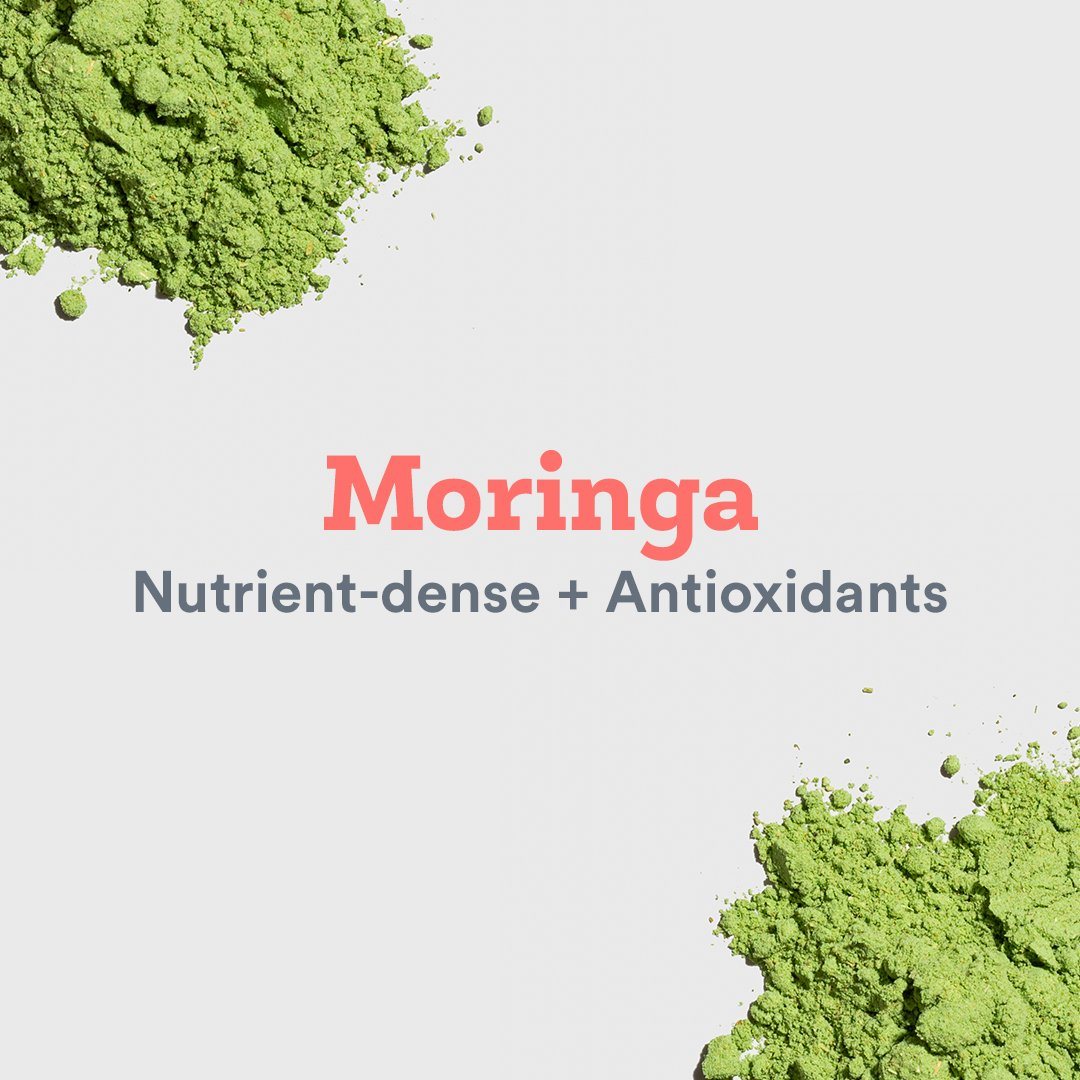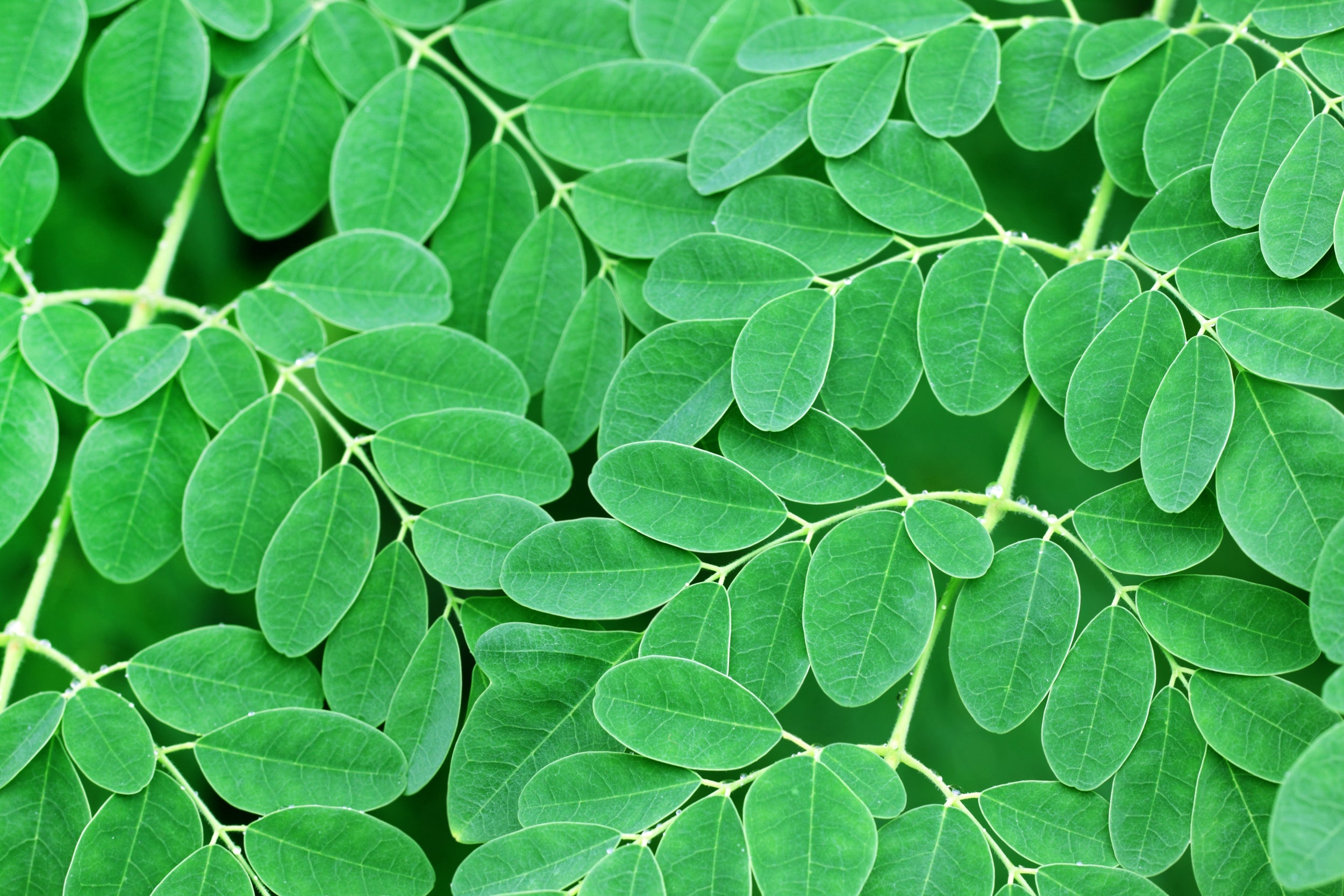
Scientific/Latin name: Moringa oleifera
Also known as: Drumstick tree, Ben oil tree, Miracle tree
Native to: sub-Himalayan mountains of northern India, but frequently grown in parts of Africa, the West Indies, the Philippines, Jamaica, and Cuba.
Parts used: Almost every part of the moringa tree is used: roots, leaves, flowers, green pods and seeds.
Top benefits: Nutrient-dense, Antioxidant-rich, Neuroprotective

Meet Moringa
There’s a new green powder showing up in lattes and smoothies, and it isn’t matcha — it’s moringa. Moringa powder has been trusted in Eastern holistic medicine for thousands of years for its high levels of nutrients and its neuroprotective qualities. Now, the Western world is catching up.
We’ll explain what moringa is, describe its benefits, and tell you how you can easily moringa-up your mornings (or afternoons).
What Is Moringa?
Moringa is a widely cultivated shrub native to the sub-Himalayan mountains of northern India. It’s now cultivated in many tropical and subtropical regions of the world, where its fruit and leaves are consumed as food, being an affordable and readily available source of major essential nutrients. Besides being used daily as food by people of these regions, Moringa is widely known and praised for its health benefits, and has earned the name ‘Miracle tree’ for its numerous healing abilities. A true superfood, although moringa was first discovered thousands of years ago, only recently did it hit the spotlight in the holistic health market.
Almost every part of the moringa tree is used for medicinal, functional food preparations and nutraceuticals, including the roots, leaves, flowers, green pods and seeds. It’s a plant with multiple biological activities including liver-protective, anti-inflammatory and antioxidant. This review will focus predominantly on the leaves.
History of Use
In traditional medicine, the leaves are used to treat numerous ailments, including malaria, typhoid fever, parasitic diseases, arthritis, swelling, cuts, skin diseases, hypertension, diabetes and more, and they are also used to induce lactation. In Ayurvedic medicine, the leaf is used to treat paralysis, nervous debility and other nerve disorders, and as discussed further below, research also suggests cognitive-enhancing and neuroprotective roles.
Health Benefits of Moringa
Antioxidants
Spoiler alert: moringa is a high source of antioxidants. But before we dive into the research, let’s talk about why antioxidants are important for our health.
Free radicals are created in our bodies as a by-product or normal metabolic processes, as well as when our bodies are exposed to certain external stressors (like UV rays, cigarette smoke, pollution, and even some compounds in household cleaning products).
Free radicals damage healthy cells, and that damage can be replicated to new cells, which means the damage is repetitive. This damage is referred to as oxidative stress. Oxidative stress can cause serious health conditions and have negative side effects, even up to premature aging and degenerative diseases.
Antioxidants have been shown to help protect against various metabolic diseases, heart disease, brain disorders and age-related syndromes, as they help the body combat cellular damage caused by free radicals. The better the balance between antioxidants and free radicals in your body, the better chance your body has to thrive.
Moringa leaves have been shown in numerous cellular and molecular studies to be a rich source of antioxidant compounds, including phenolics, flavonoids, tannins, and vitamins A, C and E. (1, 2, 3, 4)
In one animal model study, moringa leaf extract (MLE) was found to have high antioxidant activity on normal and diabetic rats, suggesting that regular dietary intake of moringa leaves through diet may help protect healthy as well as diabetic patients against oxidative damage. In an animal model of rabbits fed excessive levels of cholesterol, MLE significantly lowered cholesterol levels and reduced arterial plaque formation, suggesting that moringa has therapeutic potential for the prevention of cardiovascular diseases.
In cell models, moringa has also been found to have cancer-fighting properties, leading researchers to suggest that it might be beneficial as a medicinal plant for alternative novel anticancer drugs and nutraceutical products. From the body of research to date, it has been proposed that the main mechanism for moringa’s anticancer activity is by preventing cell proliferation by causing cell death.. (5, 6, 7, 8, 9)

Nutrient-rich
Our daily lives are busy, so it’s no wonder that it’s easy for us to gravitate towards fast food, processed snacks for meals, or simply skipping meals altogether. That can leave holes in your nutrition.
When your body isn’t getting the essential vitamins and nutrients it needs, systems begin to fail, and your overall wellness begins to tank. Moringa is a nutrient-dense superfood, which means it helps fill in nutritional gaps that might exist in your diet.
Moringa contains over 90 nutritional compounds, including proteins, fats, carbohydrates and fibre. It is so nutrient-dense, that it’s been proposed as a food that can help alleviate malnutrition and hunger in third world countries. The leaves are made up of 25% protein by weight and contain all nine essential amino acids. They're also rich in vitamins and minerals, including iron, calcium, magnesium, potassium and zinc, vitamin C, vitamin E and B-vitamins, and are a source of carotenoids including beta-carotene.
Animal model studies suggest that Moringa leaves can be used as a significant source of iron, because of their significantly higher bioavailability in comparison to ferric citrate in overcoming iron deficiency.

Neuroprotective
Better brain power? Sign us up! Supporting our brain health and cognitive function isn’t something we typically think about until we begin to notice we’re losing our mental edge. Maybe it happens because we start feeling unfocused, or we forget names or details that we could once recall with ease.
Whatever the reason, we know there are holistic ways to support brain health and improve cognition. All we have to do is use them.
Moringa leaf is traditionally used in Ayurvedic medicine to treat paralysis, nervous debility and other nerve disorders. Evidence also suggests the nootropic (aka cognitive enhancing) as well as neuroprotective roles of moringa leaf in animal testing.
In a shock avoidance test, moringa leaf extract (MLE) was found to improve memory without any cognitive deficit. MLE was also found to protect against brain damage and oxidative stress in an animal model of ischemic stroke, and in an animal model of age-related dementia, it was found to improve spatial memory and neurodegeneration. In light of the key role of oxidative stress in age-related dementia, researchers have proposed that moringa’s neuroprotective effects might be tied to its potent antioxidant properties.
In cellular studies, MLE was found to promote neuronal growth and protect neurons from naturally occurring cell death, suggesting its potential effect on nervous system health.
Caffeine Content in Moringa
Even though moringa lattes are popular, you should know they don’t contain caffeine unless they’ve been blended with another caffeinated ingredient (like coffee, matcha, or black tea).
Moringa is naturally caffeine-free, so if you’re attempting to scale back your caffeine intake, moringa can help. Because moringa helps with cognitive support, you can swap out half of your caffeine source with moringa powder and nourish your brain power without the crash.
Make It a Moringa
Moringa helps give you a boost of nutrients and antioxidant protection that fill in dietary gaps and can support your health journey. It’s also one of the easiest ways to support your brain health and enjoy elevated cognitive function.
Moringa naturally has an earthy taste that some say has a bit of a spirulina-like aftertaste. Because moringa is naturally a bit bitter, it might be difficult to add pure moringa extract to your morning latte or even hide the taste inside a smoothie.
The health research presented in this article is for informational use only. It is not a replacement for professional health advice and should not be construed as a recommendation of specific products. The products sold on this website are not intended to diagnose, treat, cure, or prevent any disease. This information does not provide dosage or format recommendations or possible drug interactions, and accordingly, should be used with the advice of a qualified health care practitioner.
